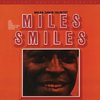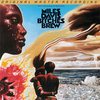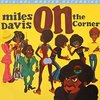Mobile Fidelity - MFSL 2-438 - 180 Gram Virgin Vinyl
Numbered Limited Edition - Pressed at RTI - 45RPM - Two Disc
Mastered by Kreig Wunderlich
1/4" / 15 IPS analog master to DSD 256 to analog console to lathe
There was an unpleasant dryness and starkness to the sound of these originals accompanied by unpleasant grain. That is why it is easy to write that these three reissues from Mobile Fidelity sound far superior to the originals. They are far more transparent, detailed and texturally more supple as well as being harmonically more fully fleshed out.Like other reissue labels, Mobile Fidelity has its hits and misses. These three double 45rpm releases along with much of the Miles catalog are among Mobile Fidelity’s best work to date. For Miles fans these are not to be missed—even if you have originals of these three - Sound 9/10 Music 10/10 Michael Fremer Analogue Planet
Sound: 8.8 - Pressing/packaging: 9.4 - Value: 9.5 - Here’s another impressive MoFi reissue of an essential early fusion Miles Davis record.Meticulously pressed, this record sounds phenomenal and is an easy recommendation - Daily Audiophile
MoFi's 'wonder team' of Krieg Wunderlich and Shawn R. Britton did a colossal tape to disc remastering and cutting to 45 rpm, supported by RTI delivering the most silent pressing I ever heard. - Tone Audio
They are up there with what I consider the crème de la crème; where outstanding music is served by outstanding sound, 5/5 Positive Feedback
the drum panned right upfront is energetically present with hi-hat and snare rolls sounding very realistic; electric piano and/or Fender Rhodes counter on the left, playing a constant game of chasing each other; electric bass centered further back is larger than life, nearly invasive, and organically 'loose' but surprisingly still substantially solid; tenor sax tends towards a lean and biting veracity; ironically it is Miles' trumpet that comes out just short of impressive with a bit of mic saturation smearing on fortes, despite its good tone. The latter caveat aside, MoFi's 'wonder team' of Krieg Wunderlich and Shawn R. Britton did a colossal tape to disc remastering and cutting -Soundeva
Davis’ Self-Proclaimed “Directions in Music” March Begins Here
Mastered from the Original Master Tapes: Abundant Jazz, Funk, and Rock Textures Rotate Around a Luscious Tonal Center
Landmark 1968 Effort Recognized as Davis’ Prelude Into Full-On Fusion: Exotic Suite-Like Album Beautiful, Intense, Adventurous
Miles Davis’ move into full-on fusion starts here. Abandoning his bebop roots and chasing electric dreams, rock-based rhythms, and ostinato pulses, the icon gives life to new music forms on Filles de Kilimanjaro, a titanic release prized for its historical significance and lasting beauty. Grounded and focused, the five compositions unfold like a unified suite. Such peak lyricism, flourishes, and phrases are experienced in the highest-possible fidelity on Mobile Fidelity’s 45RPM 2LP set.
Mastered from the original master tapes and pressed on 180g vinyl at RTI, this collectable audiophile version of Filles de Kilimanjaro joins the ranks of eleven other essential Davis sets given supreme sonic and packaging treatment by Mobile Fidelity. Loaded with revealing signatures, the record takes on even greater import when heard the way Davis and his mates discerned it in the studio. Backgrounds are squid-ink black, pianissimo lines shimmer, and the electric piano emerges with tube-amp warmth.
Indeed, the exotic sound, touch, and feel of the songs on Filles de Kilimanjaro are as crucial as the melodies. To that extent, listeners can now enjoy the expressive tonalities and lush colors from each instrument in full-range glory. Voicings, harmonics, and pitches are rendered with exquisite detail. The manners in which the textures and phrases rotate what seems like a unified tonal center places you at the original recording sessions, executed in July and September 1968.
The final appearance of Davis’ classic second quintet bears fruit on three of the record’s cuts, including the title track and R&B-tinted “Frelon Brun.” Sparked with restrained funk, driving grooves, and bluesy accents, Filles de Kilimanjaro maintains an instinctive flow and controlled fredom that permit Davis to oversee an innovative blending of alterations, improvisation, and cycles. Comprised of multiple sections, “Petits Machins” is a lesson in perfectly played melodic complexity, with chromatic riffs, dominant chords, syncopated progressions, and switching meters forming a singular mosaic.
Filles de Kilimanjaro also represents a jumping-off point for Davis’ lineup. For the September sessions, Chick Corea replaced Herbie Hancock while Dave Holland relieved Ron Carter. The new additions speak a different albeit common language, fitting in with Davis’ desire to draw from rock and weave funk into open-minded excursions filled with exoticism, soulfulness, and wonder.
More than 40 years ago, this record epitomized the future of jazz. Davis even announced such aspirations with the tagline “Directions in Music.” With the jazz world still trying to wrap its collective mind around its genius, it still does.
• Numbered Limited Edition
• 45rpm
• Mastering by Mobile Fidelity Sound Lab
• Specially Plated and Pressed on 180 grams of High Definition Vinyl
• Special Static Free - Dust Free Inner Sleeve
• Heavy Duty Protective Packaging
• Mastered from the Original Master Tapes
• Double LP
• Pressed at RTI
Musicians:
Miles Davis, trumpet
Wayne Shorter, tenor sax
Herbie Hancock, piano, electric piano
Ron Carter, bass
Tony Williams, drums
Chick Corea replaces Herbie Hancock and Dave Holland replaces Ron Carter on "Petits Machins (Little Stuff)" and "Mademoiselle Mabry (Miss Mabry)"
1. Frelon Brun
2. Tout de Suite
3. Petits Machins
4. Filles de Kilimanjaro
5. Mademoiselle Mary


GAIN 2 Ultra Analog™ is a proprietary cutting system built and designed by legendary design genius Tim De Paravicini, with consultation from one of MFSL’s founding fathers – Stan Ricker, an audio engineer responsible for many of MFSL’s most heralded past releases.
The GAIN 2 Ultra Analog™ system is comprised of a Studer™ tape machine with customized reproduction electronics* and handcrafted cutting amps that drive an Ortofon cutting head on a restored Neumann VMS-70 lathe. (*It is worth noting that independent studies have confirmed that the GAIN 2 Ultra Analog™ system can unveil sonic information all the way up to 122kHz!)
First and foremost, we only utilize first generation original master recordings as source material for our releases. We then play back master tapes at half speed enabling the GAIN 2 Ultra Analog™ system to fully extract the master’s sonic information. Our lacquers are then plated in a specialized process that protects transients in the musical signal. (Due to this process, there may be occasional pops or ticks inherent in initial play back, but as the disc is played more, a high quality stylus will actually polish the grooves and improve the sound). We further ensure optimum sound quality by strictly limiting the number of pressings printed for each release. These limited editions, in addition to being collectors’ items, ensure that the quality of the last pressing matches the quality of the first.
As you can imagine, all these efforts involve a tremendous amount of time, technology, cost and effort. The introduction of GAIN 2 Ultra Analog™ maintains Mobile Fidelity Sound Lab’s position as the world’s leading audiophile record label, where a passion for music with extraordinary sound quality matters most.
RTI HQ-180 Vinyl
Record Technology is a world class record pressing plant located in Camarillo, California. We have been operating since 1974, pressing for most audiophile record labels and for many quality minded independent and major record labels from around the world.














